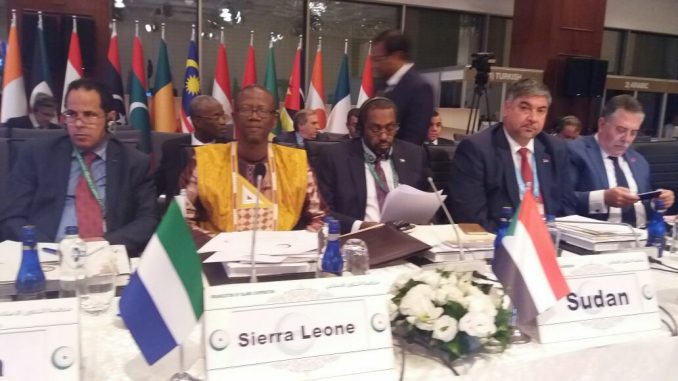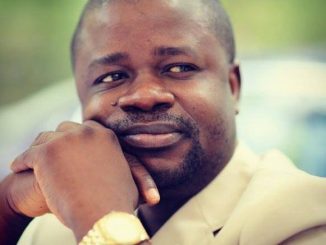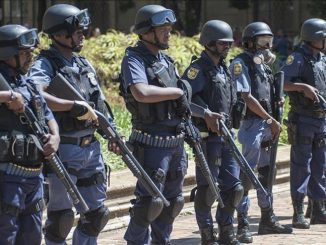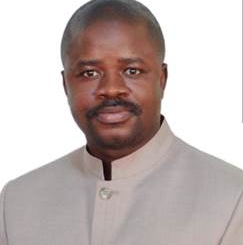
Below is the full statement of the Minister at the Istanbul Foreign Ministers Open-Ended Extraordinary Meeting.
STATEMENT BY H.E. DR MOHAMED GIBRIL SESAY, MINISTER OF STATE FOR FOREIGN AFFAIRS AND INTERNATIONAL COOPERATION OF THE REPUBLIC OF SIERRA LEONE AT THE EXTRAORDINARY OPEN-ENDED MEETING OF THE EXECUTIVE COMMITTEE AT THE LEVEL OF FOREIGN MINISTERS TO DISCUSS THE RECENT DEVELOPMENTS IN AL QUDS AL SHARIF AND AL AQSA MOSQUE, ISTANBUL, TURKEY, 1ST AUGUST, 2017
Mr. Chairman
Excellency, Secretary-General of the OIC
Excellencies and Colleague Ministers
Distinguished Heads of Delegation, Ladies and Gentlemen
I am honoured to participate in this Open-Ended Extraordinary Meeting of the OIC Executive Committee at the level of Foreign Ministers to discuss the recent escalation of tension and unrest in Al-Quds Al-Sharif and, in particular the actions against the sanctity of the Al Aqsa Mosque, the first Qibla of our faith, Islam in this hospitable historic city of Istanbul. Let me at the outset and, on behalf of the Sierra Leone delegation, register our profound appreciation to H.E. President Recep Tayyip Erdogan, the Chair of the 13th Islamic Summit Conference for his initiative and directive for the convening of this emergency Extraordinary Open-Ended Meeting of the Executive Committee at the level of Foreign Ministers. My gratitude also goes to the Government and the people of the Turkey for hosting this emergency meeting and the generous hospitality accorded my delegation.
Dr. Gibril Sesay heads Sierra Leone delegation to Turkey
As a member of the UN Committee on the Exercise of the Inalienable Rights of the Palestinian People, Sierra Leone firmly believes that this Extraordinary Meeting at the level of Foreign Ministers is both timely and critical for these reasons:
a) For the OIC to take bold steps to recharge the conscience of the global community, the region and the entire Islamic Ummah to facilitate effective engagement in meaningful peace talks
b) To map out concrete actions and implement practical steps toward a durable cessation of violence to ensure a sustained engagement in the peace process for the realization of the Two-States solution, with Israel and Palestine living side-by-side within secure and recognized borders consistent with the relevant UN Security Council resolutions and other initiatives.
That said Mr. Chairman; the recent heightening of violence in Al Quds Al Sharif spreading across Ramallah and its untold consequences is very concerning. Israel’s decision to install metal detectors at the Masjid Al Aqsa is an unprecedented unilateral security measure that escalated tensions and that has led to the deaths of several people protesting against the increased restrictive measures. As a country, Sierra Leone holds firmly to the right of access of a people to their religious site as inalienable part of the exercise of their freedom of conscience. In these times, when religious sites are targeted for violence, we also maintain that security of worshippers must be protected, but this should be done in consultations with leaders of the faith, and respectful of the values and sensitivities of the religious community. We say this as a country that is foremost in the promotion and exercise of religious harmony and peaceful co-existence. It is in this light that we call on Israel not to act in ways that the world perceives as a violation of the rights of a people to access their religious sites in a land that Islam, Judaism and Christianity call holy. The rights of Palestinians to access Al Haram Al Aqsa must be maintained. We commend the concerted efforts of Egypt, France and Sweden that called on the UN Security Council to hold an emergency meeting on the crisis.
We urge the resumption of talks on the two state solution as the sustainable path to deescalating tensions in the holy land, and that the two state solution offers a most viable pathway for a peaceful co-existence of Palestinians and Israelis, and of Muslims, Christians and Jews in the holy land of the three faiths. The most peaceful times in the history of the holy lands were times when this cardinal truth was upheld by the sovereigns of that hallowed land. Religious fault lines can only be bridged by adherence to these facts of justice, security and sustainable peace.
We are disheartened by images of death and suffering in the holy land. We are disheartened by images of women and children wailing in grief in the land that we call holy. A holy place must be a place of peace, empathy and fraternity. Images of a holy place that run counter to these expectations are very concerning to us. We call for the resumption of mediation processes, such as those of the Quartet’s Road Map and the Arab Peace Initiative for the attainment of the two-state solution with Al-Quds Al-Sharif (East Jerusalem) as capital of the State of Palestine and, to lay the foundation for the attainment of peace, security and stability in the region.
I thank you very much for your kind attention.



